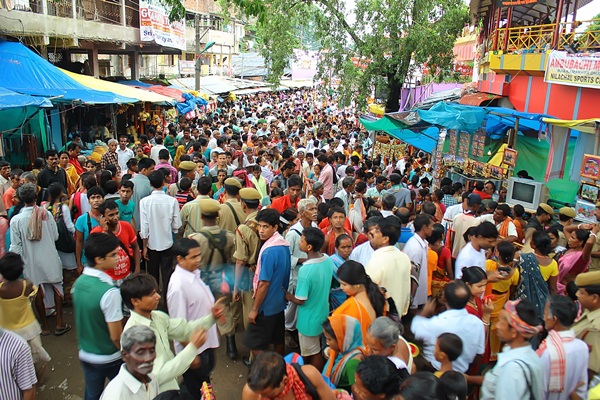Rediscovering the values of our democracy at the grassroots.
ROSHAN LOBO OFM
Garo dokan—a small market where I live in Bongaigaon district of Assam, provides all the things necessary for sustenance of life.
Life here is uncorrupted by rampant consumer- ism or mall culture. Buying and selling happens in a simple manner. Scouring for things in the market is not difficult because unlike a mall or supermarket, choices, which create needless anxiety and drain time, are limited. Organic and fresh vegetables brought from the field are sold, fresh fish from lake intrigues, tasty singras (samosa) with a cup of tea is a delicacy.
At a little distance from the market, there’s a funfair where people throng to savour sweets, shop and more importantly offer homage to the deity installed in a little corner.
The months of September, October and November usher in a time of festive jubilation in India beginning with the Navaratri, Dusshera and culminating with Diwali. Festive occasions are a time to forget the mundane and indulge in little pleasures. Here in Assam too, in this time of festivity, Melas happen in different corners. If a celebration at home is important, what is even more vital is the coming together of people from a locality belonging to different tribes and languages. Any mela here is just the right platform for that! There aren’t expensive things sold here. We find fresh and hot jalebis, instant snacks, games for children and adults, cutlery and music. For many folks here, the mela provides a leisurely break. Apart from all the fun, what we notice evidently is the mixing of people from diverse backgrounds for the sake of doing business. Mela provides an opportunity for people to do business. Here there is no distinction based on caste or creed.
The coming together of people from diverse walks of life in any mela or religious gathering is not a new thing. It is an age-old practice.
However, the recent events of vendetta politics played in the name of communal polarisation calls for serious reflection. A peaceful co-existence of people from all religions and classes is necessary for the smooth functioning of society. Religion and economy act as backbone for this, and are interlinked. Just as religion brings spiritual solace, so does the economy. Festivals contribute in many ways for keeping economic figures up. India has seen sharp growth in inflation but it has not affected the way we celebrate our festivals.
The looming threat of nuclear war, sharp de- cline in global spending, shrinking economies around the world etc. have not deteriorated our spirit of celebration. Reuters reported that in the peak festive season during which online shopping platforms entice people with lucrative offers ranging from cars to earrings or TVs to garments. The post-pandemic online sales doubled to $27 billion in India. No matter how badly our economy may perform, we do not see its impact on our consumerism.
‘Boycott culture’, which is dogging new releases in Bollywood, is the latest entrant to the arena of business and religious politics. An article in The Newsminute reported as to how Coastal Karnataka, a place of peaceful coexistence has become a hotbed for divisive politics and communal polarisation. In Kapu of Udupi District in Coastal Karnataka, where for 1,300 years, Muslim traders, who took part in the annual festivities of the shrine dedicated to deity Maari, have been targeted by Hindutva groups and barred from doing any business in and around the temple premises. Similar is the case in rest of the country.
Irrespective of caste, creed or religion, every- body benefits from business transactions. For a harmonious existence, members from diverse strata of society collaborating with one another is of paramount significance. In such a scenario a call for boycott, certainly affects the livelihood of the victims of boycott.
The adage ‘United we stand, divided we
fall’ is very crucial to our understanding of the political and social reality of today. An earnest and soul-searching fact-check may help us to see where we stand as a civilised society and in which direction we are heading to? What does a simple festive gathering of people or Mela can teach us all? We need each other. We cannot boycott one another. Our survival depends on the fabrics of unity and peaceful co-existence.
∎